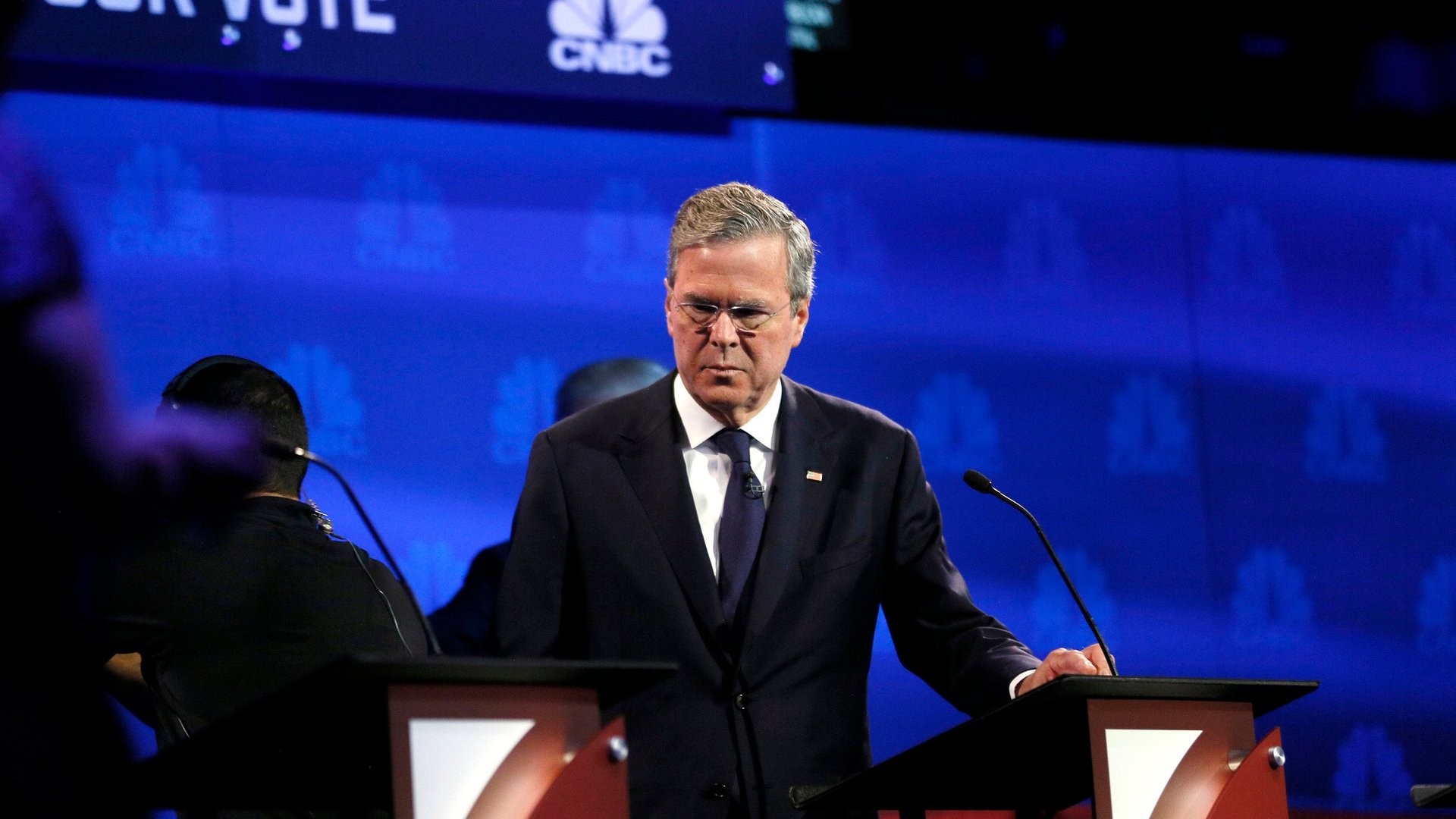Jeb blunders in a pivotal debate, and Republicans are still looking for their anti-Trump
Three debates in, and the Republican establishment is still looking for a real nominee. Anyone?


Three debates in, and the Republican establishment is still looking for a real nominee. Anyone?
The cavalcade of ten candidates seeking to the GOP presidential nomination next year had a few things in common: A dislike of government and taxes, a loathing of the press, and an inability to convince political insiders and business interests that they can win an election against Democratic front-runner Hillary Clinton.
The opinion polls aren’t confused: The national frontrunner is outspoken businessman Donald Trump, and in the key early state of Iowa, it’s evangelical physician Ben Carson. But few in Washington think either man has the capacity for the job or the ability to win a general election.
Tonight’s event in Boulder was supposed to be the debate where Jeb Bush, former Florida governor and well-financed Republican scion, would make his stand. But he fell flat—garnering less airtime than any candidate other than Kentucky Senator Rand Paul.
In one demoralizing encounter, Bush attempted to smack down his former political ally, Florida Senator Marco Rubio, for spending too much time on the campaign trail instead of casting votes in Washington. But the confrontation ended with the Rubio running verbal circles around a flummoxed Bush: (from 0:32)
Rubio—who the Bush campaign has spent the week bafflingly painting as “the GOP Obama”—is the other great hope for the establishment. That’s despite, or perhaps because of, a flirtation with immigration reform that left many in the Republican base skeptical. While Rubio was well prepared with good answers for attacks on his personal finances and voting record, an attempt to explain his tax plan (yes, Senator, it does benefit the wealthy more than the middle-class, even when scored by a conservative think-tank) left the audience wondering if he understood simple math.
Bush tried to get back into the spotlight with remarks criticizing government intervention in the markets—which he immediately followed with an endorsement of regulation for the daily sports fantasy sports industry. This flip-flop left him easy pickings for New Jersey Governor Chris Christie, an avowed fan of sports gambling, who lambasted talk of regulating FanDuel while bigger issues remained unaddressed.
Christie, in 2012 a darling of the Republican establishment, delivered his familiar tough-talk on taxes and a crack at the moderator that apparently pleased viewing Republicans. Nevertheless, Christie’s long list of complaints about Obama’s Department of Justice were a reminder that the New Jersey governor’s appointees are facing federal corruption investigations.
Ultimately, the moment that Bush needed was seized by Ohio Governor John Kasich, who channeled Howard Beale with outraged complaints about the other candidates’ empty promises and lack of experience. Kasich reminded the audience that back in 1994, he was basically Paul Ryan—conservative revolutionary, budget wonk—and he actually got a balanced budget deal.
And then Donald Trump reminded us how ruthless he can be, brushing aside Kasich’s success in Ohio as a result of the fracking oil boom and reminding everyone that Kasich worked at Lehman Brothers before it collapsed—not as a member of the board, as Trump said, but as a managing partner. (Bush, we note, had also been a consultant to Lehman.) Kasich stumbled to clarify and never quite regained his footing.
We still haven’t even got to everyone on stage, so, briefly: Huckabee led a discussion about how social security is theft. Carson appeared perpetually on the verge of sleep. Senator Rand Paul promised to filibuster the bipartisan compromise that will avoid a US debt default, while Senator Ted Cruz, when asked about it, used his time to complain about how he wasn’t asked a substantive question.
And Carly Fiorina, who tends to shine at debates and had the most speaking time, laid out a narrative of big, powerful corporations are consolidating with government help–fairly ironic concerns from a former Fortune 500 CEO who led the consolidation of the computer industry. Her biggest applause line was the claim that every one of Clinton’s policies are demonstrably bad for women—a line of argument that Clinton’s fact checkers will be happy to dismantle.
Ultimately, consolidation is certainly what the GOP needs, yet a war of attrition awaits for Republicans who wish to defy the conservative public opinion that has put Trump and Carson in front. Bush’s disappointing turn as a campaigner may yet force him out of the race, but he can probably afford to remain in the race until Iowa votes in January—at least if his dignity can bear it. Only Rubio and Cruz really have the cash to do the same. Bring on the next set of polls!